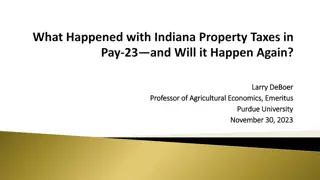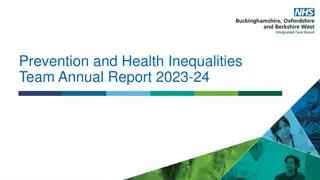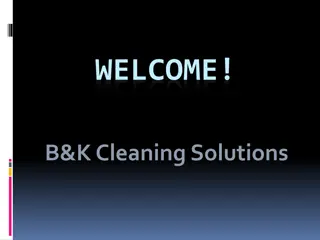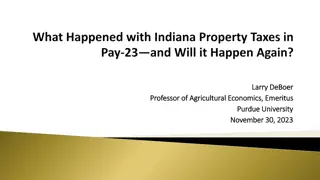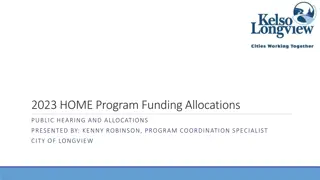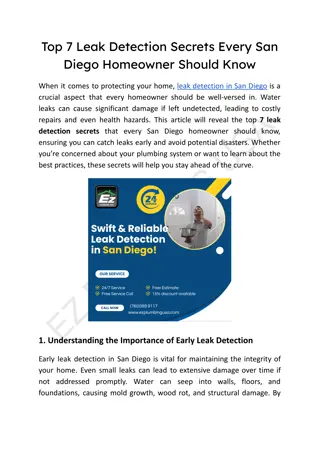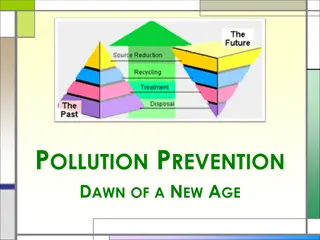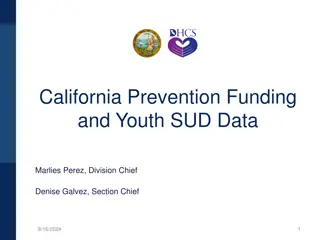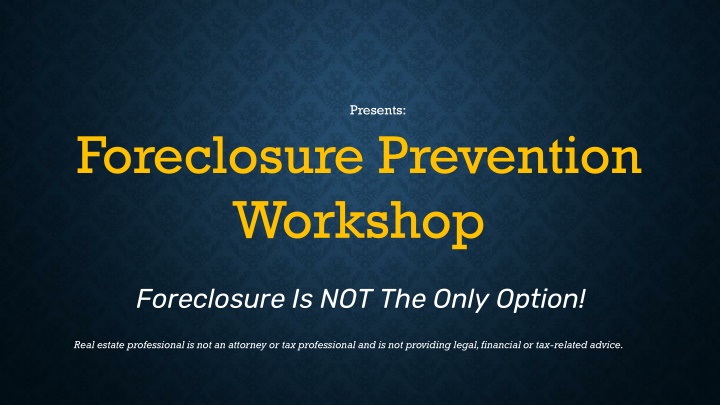
Foreclosure: Prevention, Consequences, and Options Explained
Discover valuable insights on foreclosure prevention, consequences, and available options in this comprehensive workshop. Learn about the foreclosure process, timelines, and potential impacts on credit and future purchases. Find out how to navigate through this challenging situation with knowledge and support.
Download Presentation

Please find below an Image/Link to download the presentation.
The content on the website is provided AS IS for your information and personal use only. It may not be sold, licensed, or shared on other websites without obtaining consent from the author. If you encounter any issues during the download, it is possible that the publisher has removed the file from their server.
You are allowed to download the files provided on this website for personal or commercial use, subject to the condition that they are used lawfully. All files are the property of their respective owners.
The content on the website is provided AS IS for your information and personal use only. It may not be sold, licensed, or shared on other websites without obtaining consent from the author.
E N D
Presentation Transcript
Presents: Foreclosure Prevention Workshop Foreclosure Is NOT The Only Option! Real estate professional is not an attorney or tax professional and is not providing legal, financial or tax-related advice.
You Are NOT Alone! Millions of homeowners are struggling economically and are not able to make their monthly mortgage payments!
Knowledge is Key! Know your options.
Foreclosure Explained Foreclosure is a PROCESS, not a single event. States are either Judicial, Non-Judicial or both. Foreclosure can also be initiated if delinquent on HOA/CONDO PAYMENTS or PROPERTY TAXES.
Foreclosure Timeline Default: Occurs upon their first missed mortgage payment. Federal Law requires that the lender wait until the borrower is at least 120 days delinquent on their mortgage. Legal Notice: The lender or foreclosing party must notify the owner that they are entering into the foreclosure process. This can be done through either personal service of a document or, if the owner cannot be located, through publication in a legal journal. In Florida, this is called a Notice of Lis Pendens (or notice of a lawsuit.) In California, it is called a Notice of Default or NOD . In different states, it can also be referred to as a Complaint, Notice of Sale or a Petition . Bank Sale or Auction Date: The homeowner is informed that he or she has a bank sale or auction date, at which point the foreclosing mortgage company will gain control of the property. Redemption Period: Not all states have a redemption period. This is a period of time in which the homeowner may present payment to the bank and regain possession of the property.
Future Purchase & Credit Impact A foreclosure can remain on a credit report for up to 7 years. They could be ineligible for a GSE loan for 5-7 years (only 2-3 years in a short sale). They must DISCLOSE on any mortgage application and many job applications. Credit scores can be significantly LOWERED
Potential Employment Issues Many employers run credit checks either prior to hiring or at random intervals throughout a person s employment. A foreclosure on their record could cost them their current job or prevent them from getting hired. Security Clearances Many jobs and professions require a security clearance, not limited to Government jobs, Military, Law Enforcement, etc. Foreclosure can jeopardize their security clearance and risk loss of employment.
Potential Deficiency Judgment Check if your State allows the lender(s) to pursue a deficiency judgement against the borrower(s). If so, the lender(s) to sue the borrower to recover losses. Applies to both Short Sales & Foreclosures. In a properly executed Short Sales, the lender(s) WAIVES THE RIGHT to pursue a deficiency judgment.
Tax Liability Due To Cancellation of Debt Forgiven debt is considered taxable income. Homeowner may qualify for Qualified Principal Residence Indebtedness (QPRI) exclusion. The QPRI exclusion expires on January 1, 2026 Only mortgage debt forgiven in the calendar years (not tax years) 2007 through 2025 (or after January 1, 2026, if they entered into a written agreement before that date) qualifies. The forgiven debt must have been incurred to purchase, build, or make significant renovations to your principal residence.
Tax Liability Due To Cancellation of Debt Funds from refinanced debt will do qualify for exclusion BUT only if those funds were used to make significant renovations or improvements to their primary residence. If the forgiven debt qualifies, as of December 31, 2020, you can exclude up to $750,000 ($375,000 if married and filing separately). Prior to this date, the taxpayers could exclude up to $2 million ($1 million if you're married and filing separately). If the homeowners don t qualify under the (QPRI) exclusion, they may qualify under other options, such as insolvency or bankruptcy. Homeowner should speak with a Tax Professional and/or Attorney.
FORECLOSURE IS NOT THE ONLY OPTION!
Foreclosure Alternatives: Keeping The Home
REINSTATING THE LOAN A viable option if the hardship was temporary and has been resolved. Can usually be done up to the Bank Sale Date All past due payments and late fees must be paid in full prior to the sale or auction date
FORBEARANCE OR REPAYMENT PLAN A viable option if the hardship was temporary and has been resolved. Borrower contacts lender for approval. Borrower may be allowed to make their back payments over time. Normally does not fully reinstate mortgage until plan is competed
REFINANCE Not a viable option if they don t have sufficient equity, a qualifying credit score or they are behind on their mortgage payments.
LOAN MODIFICATION May reduce payments by lowering interest rate and/or extending the repayment period. Requires that you qualify for the loan, based on actual income. Many times, results in higher mortgage payments. Typically, does not reduce the principal balance. High redefault rate.
BANKRUPTCY Delays a foreclosure, as the court issues a STAY of foreclosure. More complicated to sell the property once initiated, as it requires Trustee approval. Will only delay a foreclosure does not equate to a free house or no mortgage.
RENTING THE PROPERTY In some cases a homeowner facing foreclosure will have payments low enough to allow him or her to rent the property and keep up the mortgage payments. It is imperative that taxes and insurance be included in calculations that establish whether or not market rent will cover all amounts required to keep the mortgage current. If you have a potential client that is using this as a solution, it is important to evaluate the other risks associated with renting. Unpaid Rent: In the event a tenant does not pay rent or does not pay rent on time, will the homeowner have the cash reserves to keep the mortgage current? Repair Costs: If there is a major (or even minor) repair required to the property, will the homeowner have the cash reserves or a home warranty in place to make the repairs?
Vacancy: In the event the property is vacant while marketing it for rent, will the homeowner have the cash reserves to keep the mortgage current while it s being marketed? When a distressed homeowner requests to rent the property ... The homeowner may request that you list the property for rent. You may already be aware that the homeowner has missed, or will miss payments soon making the mortgage payment delinquent and the tenant in danger of being evicted. If this is the case, it is suggested that you not list the property for rent and pursue another foreclosure alternative. When you find out your rental listing is distressed ... You may already have a rental listing and find out either directly from the homeowners or from other means such as the current tenant, that the homeowners have been served notice of foreclosure. In this situation, communicate with the homeowners that renting is probably not the best option, especially since both they and you have prior knowledge that the property is distressed.
Foreclosure Alternatives: Leaving The Property
SELL THE PROPERTY If the property has equity, list it as a regular sale. Order payoffs right away to verify the amount owed. Perform title/lien searches. Communicate with the servicer(s). Inform them that the property is listed for sale and at the conclusion, they will be made whole. Caution: Be aware of any possible sale/auction date.
DEED IN LIEU OF FORECLOSURE Title of property is transferred to the lender instead of undergoing the foreclosure process. Caution: Can appear on their credit report as a foreclosure. Usually only works only in cases with one mortgage. Forgiveness of debt taxes and/or deficiency judgement may apply
BANKRUPTCY Delays a foreclosure, court issues a STAY of foreclosure. More complicated to sell the property once initiated, as it requires TRUSTEE approval. Will only delay a foreclosure does not equate to a free house or no mortgage.
What if your property is under water , has no equity? (You owe more than the property can be sold for to cover all outstanding liens, closing costs and commissions) A Short Sale is a viable option.
SHORT SALE EXPLAINED
SHORT SALE Property MUST be underwater. More is owed, including closing costs and commissions, than the property can be sold for. A Short Sale takes place when a contract is submitted to the bank(s), for LESS than the amount owed. Bank accepts offer and releases TITLE, allowing the sale to take place. Not intended to be a get me out of my mortgage free card. Supposedly only for those who meet all Qualifications. Strategic Default takes place when a homeowner can make the payments but chooses not to.
Why Work with a CDPE? Certified Distressed Property Expert
WHY WORK WITH A CDPE? Through comprehensive training and experience, CDPEs have an understanding of the complex issues confronting distressed properties. We are able to survive and thrive in current market conditions while providing solutions for homeowners facing hardships. CDPEs don t merely assist in buying and selling properties, we serve and help save our clients in need.
WHY HIRE A CDPE? Through comprehensive training and experience, CDPEs have an understanding of the complex issues confronting distressed properties. We are able to survive and thrive in current market conditions while providing solutions for homeowners facing hardships. CDPEs don t merely assist in buying and selling properties, we serve and help save our clients in need.
The Next Step Private Consultation


